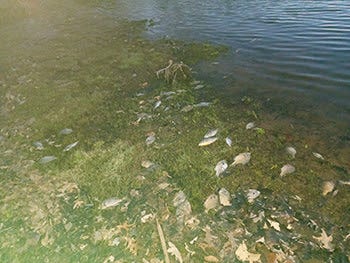
DETROIT (WWJ) - As lakes and rivers began their spring thaw, state officials are reminding Michiganders that seeing dead or dying fish surfacing in large amounts might seem like something fishy is going on -- but it's perfectly normal.
The phenomena, called "winterkill" is described as the most common type of fish kill, the Michigan Department of Natural Resources explained. It happens when sunlight cannot reach submerged plants during the winter months, depleting oxygen levels for the fish and suffocating them to death.
But it's nothing to be worried over, the DNR said.
"As the season changes, it can be particularly common in shallow lakes, ponds, streams and canals," Gary Whelan, DNR Fisheries Division research manager said. "These kills are localized and typically do not affect the overall health of the fish populations or fishing quality."
Winterkill can be observed roughly one month after ice thaws out from shallow water sources. The fish typically die in later winter, but the ice and cold water preserve the fish until the spring melt.
When winterkill occurs, it tends to be an ugly and startling sight for those who stumble across it.
"[It] begins with distressed fish gasping for air at holes in the ice and ends with large numbers of dead fish which bloat as the water warms in early spring," Whelan said. "Dead fish may appear fuzzy because of secondary infection by fungus, but the fungus was not the cause of death. The fish actually suffocated from a lack of dissolved oxygen from decaying plants and other dead aquatic animals under the ice."
The dissolved oxygen is essential for all forms of aquatic life. Winterkill is not limited to just fish -- it also causes other creatures, such as turtles, frogs, toads and crayfish, to die.
The DNR said fish that survive winterkill can also die in the springtime due rapid fluctuations in water temperature. The fish can become stressed when temperatures jump from hot to cold, leading to death.
Additionally, surviving fish can be fatally affected by the decomposition process of animals that died during winterkill.
"Once the oxygen is reduced and other aquatic animals die and start decomposing, the rate that oxygen is used for decomposition is additionally increased – that means that dissolved oxygen levels in the water decrease even further, leading to increasing winterkill," the DNR explained.
For more information on fish kills in Michigan, visit Michigan.gov/Fishing.
The DNR said residents are welcome to report fish kills to their department using the Eyes in the Field website, which officials say is "valuable to the DNR's ability to manage the state's aquatic resources."
If you suspect a fish kill is due to nonnatural causes, call the nearest DNR office or Michigan's Pollution Emergency Alert System at 800-292-4706.
